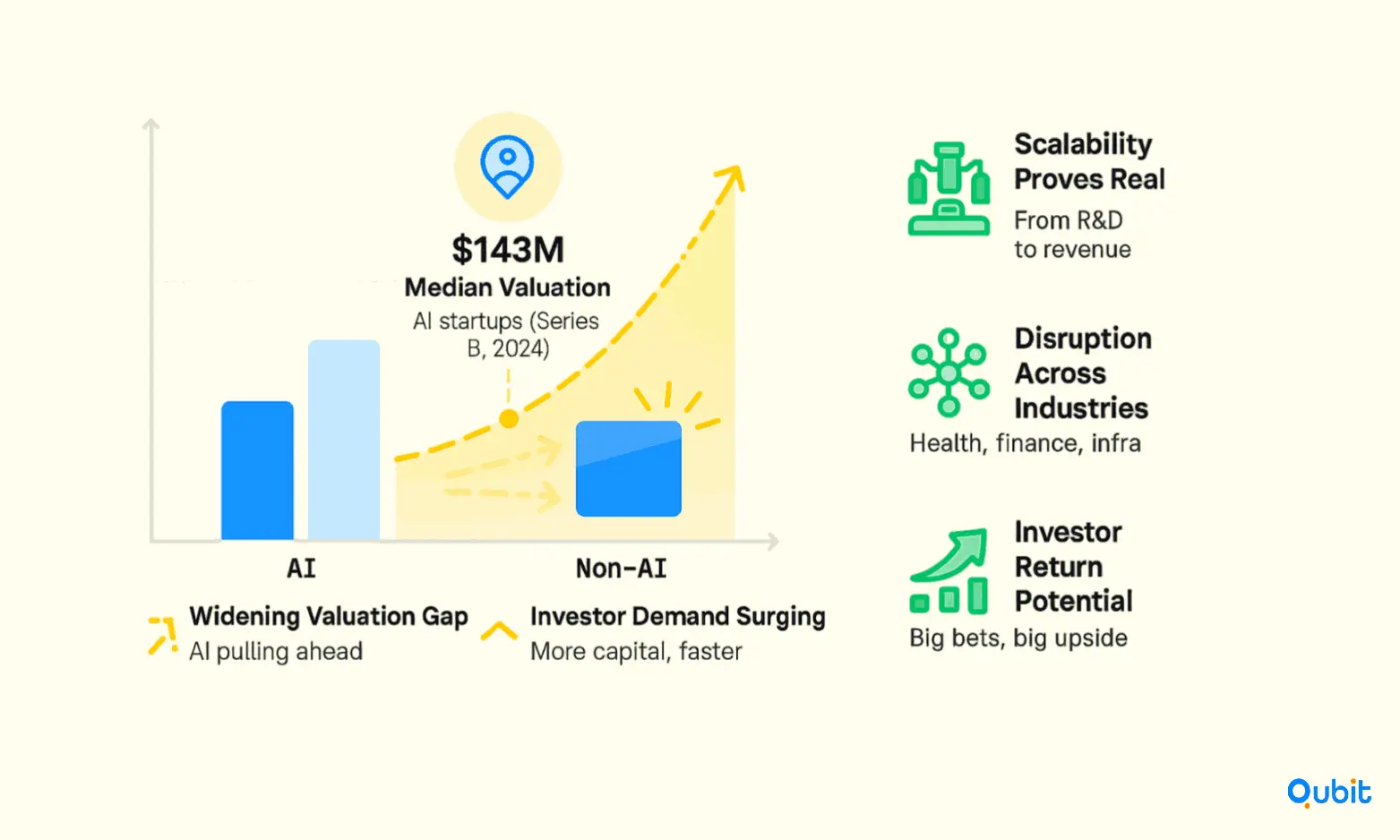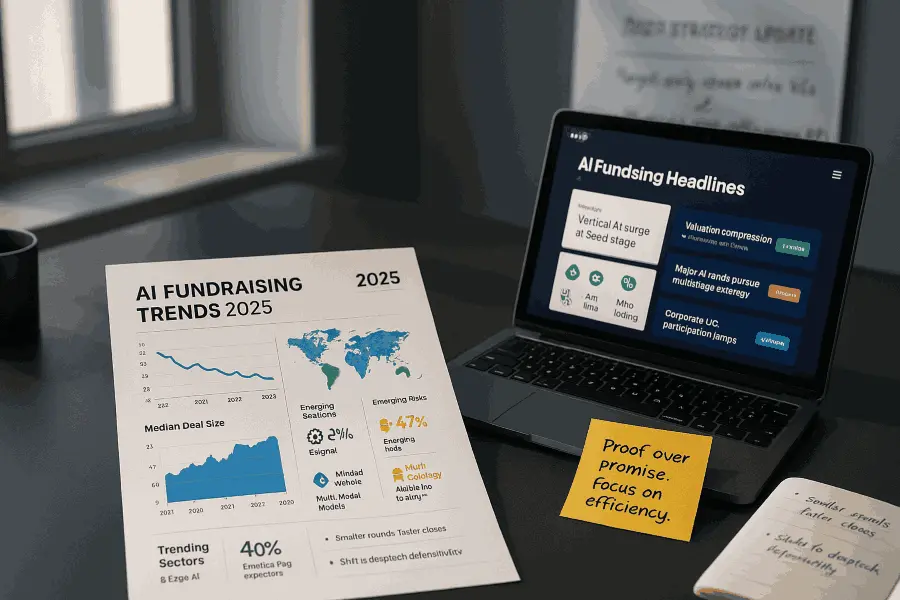AI isn’t just “hot” anymore, it’s eating venture capital. In 2024, AI startups pulled in roughly $100–130 billion in venture capital, grabbing about one-third of all VC dollars globally. If you’re building a startup, you’re not just competing with other founders, you’re competing with this tidal wave of AI money and attention.
Investors are doubling down on consumer-facing generative AI tools like ChatGPT, products that feel magical to users and can scale fast. That’s where the loudest buzz and biggest cheques are going. For founders, the message is clear: if you want to raise, you need to understand how these AI funding currents are shifting and position your startup right in the middle of them, not watching from the sidelines.
This guide will cut through the hype and show you where AI money is actually flowing, what investors are secretly optimising for, and how to position your startup so you look fundable, not forgettable.
AI Startup Fundraising Trends: Securing a Third of VC Capital
Investor focus is tilting hard toward AI. In the most recent cycle, AI startups attracted about 131.5 billion dollars in venture funding, growing roughly 52 percent while funding to non AI startups slipped almost 10 percent to around 237 billion dollars. Capital is not just flowing into the market, it is actively being reallocated toward AI.
Recent quarters have delivered some of the largest AI funding totals ever recorded, with one period alone crossing 47.3 billion dollars invested into AI companies worldwide. AI now absorbs close to one third of global venture capital, even though it still represents a smaller share of the overall startup landscape. Investors are placing bigger, more concentrated bets on fewer AI companies.
The wider venture market remains healthy. Global VC investment has climbed from roughly 349.4 billion dollars to about 368.3 billion dollars across more than 35,000 deals, which means there is ample dry powder for founders who can show they belong in the AI winner bucket.
To rise above the noise, founders should:
- Validate product market fit with real usage, retention and revenue signals
- Prepare a clear, staged milestone roadmap for product, go to market and hiring
- Research VC focus areas and target funds that are explicitly leaning into AI
- Build data driven pitch decks that highlight traction, economics and defensibility
- Network deliberately to secure warm introductions from angels, operators and portfolio founders
At the same time, rising valuations can hide real risks. Faster moving competition, sharper growth expectations and stronger investor pressure can quickly turn a shiny cap table into a strain on the business. Smart founders treat this AI funding wave as leverage, not a shortcut.
High Late-Stage Investments: Proving AI's Maturity
Investor confidence in artificial intelligence (AI) startups reached unprecedented levels in 2024, with nearly half of all late-stage capital directed toward these ventures. This surge in funding highlights the growing maturity of AI companies and their ability to deliver scalable solutions, making them a focal point for investors seeking high-growth opportunities.
The allocation of late-stage funding to AI startups underscores their transition from experimental technologies to proven business models. Mature AI ventures are now demonstrating their capacity to generate consistent revenue streams, attract enterprise clients, and scale operations globally. This shift has positioned AI as a primary growth area for investors, reinforcing the sector's reliability and long-term potential.
Such funding patterns also reflect a broader market validation. Investors are increasingly confident in the ability of AI startups to address complex challenges across industries, from healthcare and finance to logistics and retail. By focusing on late-stage investments, stakeholders are betting on companies that have already established product-market fit and are poised for exponential growth.
The Role of Mega-Rounds in AI's Growth
Mega rounds, funding rounds above 100 million dollars, now sit at the center of AI fundraising. They concentrate large amounts of capital into a small group of high performing startups and turn a few players into category leaders. These deals give founders the resources to scale fast, dominate distribution, and hire aggressively, while sending a clear signal that investors expect AI to deliver real, transformative solutions.
A closer examination of advanced funding patterns is presented in AI mega rounds funding, which details the evolution of mega-round investments and their implications for capital concentration.
Crusoe is a recent example of late stage scaling in action. The company announced 1.38 billion dollars in new Series E funding at a 10 billion dollar valuation. This capital is earmarked for rapid expansion of its AI data center operations and shows how much appetite there is for infrastructure heavy AI projects that require deep, long term investment.
Capital is also clustering geographically. Private AI investment in the United States has reached about 109.1 billion dollars, nearly 12 times China at 9.3 billion dollars and 24 times the United Kingdom at 4.5 billion dollars. This gap highlights how late stage capital is concentrating in the US, shaping where the largest mega rounds are most likely to land.
For those seeking actionable strategies, the insights provided in how to raise money for AI startup offer a broader context that complements the detailed strategies discussed here, enriching your understanding of foundational fundraising approaches. By understanding these trends, founders can position their startups to attract the right investors and thrive in a competitive market.
Booming Seed Stage: Elevated Valuations and Early Success
According to AI Startup Fundraising Trends, seed-stage AI startups are experiencing unprecedented growth and elevated valuations.
The seed-stage funding landscape for AI startups is experiencing unprecedented growth, with valuations soaring well above their non-AI counterparts. Recent data highlights that seed-stage AI companies command a 42% premium in valuations compared to non-AI startups, underscoring the immense demand for innovative AI solutions. This trend reflects not only the market’s enthusiasm but also the rapid traction these ventures achieve early on.
1. Seed Valuations: A Clear Premium
AI startups at the seed stage are setting new benchmarks. Median pre-money valuations (valuation of a company before new funding is added) now reach approximately $17.9 million.
For example, the case study of Frances Mistral AI illustrates how seed valuations for AI startups can skyrocket early on, providing a glimpse into the lucrative opportunities available in this space. Such examples highlight the ability of AI startups to attract substantial funding even in their infancy, driven by their promise of innovation and scalability.
2. Early Success Stories
The elevated valuations are not just numbers, they reflect tangible success stories. AI startups often demonstrate rapid traction, securing partnerships, scaling operations, and delivering measurable outcomes within months of inception. This ability to achieve early milestones makes them particularly attractive to investors seeking high-growth opportunities.
Moreover, the discussion in AI startup early exits investor impact reveals how talent shifts and early exit scenarios subtly influence investor valuations, aligning with the broader fundraising trends covered in this guide. Strong founding teams and the potential for quick exits further amplify the appeal of seed-stage AI ventures, creating a dynamic environment for growth.
The Bigger Picture
Seed-stage funding trends in AI are reshaping the startup ecosystem. Investors are increasingly drawn to the sector, recognizing its ability to deliver outsized returns. The 42% valuation premium is not just a reflection of market hype, it’s a testament to the tangible value AI startups bring to the table.
Seed momentum is matched by strong Series A growth. In 2024, average Series A valuations increased 23% year-over-year worldwide. This broad uplift signals investor readiness to back promising new entrants aggressively. As the demand for AI solutions continues to grow, seed-stage funding will remain a critical driver of innovation, enabling startups to scale rapidly and transform industries.
Rapid Growth in Series A: $50M+ Valuation Milestone
AI startups are redefining early-stage funding benchmarks, with Series A rounds consistently achieving median valuations exceeding $50 million. This trend highlights the growing investor confidence in AI-driven innovation and its transformative potential across industries.
AI Startups Outpacing Non-AI Peers
Recent data reveals that Series A funding for AI startups averages $51.9 million, approximately 30% higher than their non-AI counterparts. This disparity underscores the heightened market appetite for ventures that demonstrate scalable AI solutions and mature early-stage traction. Investors are increasingly drawn to startups with robust AI capabilities, recognizing their ability to address complex challenges and unlock new revenue streams.
Factors Driving Elevated Valuations
Several factors contribute to the elevated valuations of AI startups during Series A rounds:
- Market Demand for AI Solutions: Industries ranging from healthcare to finance are actively seeking AI-powered tools to enhance efficiency, reduce costs, and improve decision-making. This demand fuels investor interest in startups that can deliver these solutions.
- Proven Early Traction: AI startups often showcase measurable success in pilot programs or initial deployments, providing tangible proof of their value proposition.
- Scalability Potential: The ability of AI technologies to scale across diverse applications makes them particularly attractive to investors looking for high-growth opportunities.
Implications for Founders and Investors
Global startup funding reached $285 billion in 2024. Strong Series A valuations thus occur within a market experiencing both scale and investor enthusiasm. For founders, the higher valuations in Series A funding present an opportunity to secure substantial capital while retaining equity.
However, it also raises expectations for delivering rapid growth and scaling operations effectively. Investors, on the other hand, are betting on the long-term impact of AI innovations, often prioritizing startups with strong technical teams and clear market strategies.
Expanding Valuation Gap at Series B: Opportunities for Growth
Series B funding rounds have become a pivotal stage for AI startups, reflecting a dramatic shift in investor priorities. Median valuations for these companies have surged to approximately $143 million, showcasing the growing appetite for growth-stage investments. This trend underscores the widening valuation gap between AI-focused ventures and their non-AI counterparts, presenting unique opportunities for both startups and investors.
This momentum stands out in a challenging market. A 33% decline in total VC investments was observed in Q3, with figures dropping to $171 million from $255 million the previous year. AI’s growth amid contraction emphasizes resilience.

The Rise of AI Startup Funding Trends
The increasing median valuation of $143 million in Series B rounds highlights the robust confidence investors have in AI startups. This figure not only signals the potential for larger investments but also emphasizes the strategic importance of growth-stage funding. Investors are drawn to the scalability and innovation that AI companies offer, making them a prime target for substantial capital injections.
Why Series B is a Turning Point
Series B rounds often mark the transition from early-stage experimentation to scalable business models. For AI startups, this stage is critical for expanding operations, refining products, and capturing market share. The valuation gap between AI and non-AI startups at this stage reflects the heightened expectations for AI-driven solutions to disrupt industries ranging from healthcare to finance.
Opportunities for Investors
The widening valuation gap presents a compelling case for investors to focus on AI startups during Series B rounds. With median valuations already high, the potential for exponential growth remains strong. Investors who recognize the transformative power of AI technologies can capitalize on these opportunities, fostering innovation while securing significant returns.
As AI continues to redefine industries, Series B funding rounds will likely remain a hotbed for growth-stage investments. For startups, this is the moment to demonstrate scalability and market impact, while investors can align their portfolios with the future of technology.
AI Startup Fundraising Trends: Outlook and Forecasts
AI startup fundraising is moving into a different league. Investors are shifting capital away from non-AI plays and toward AI, building on a recent record of roughly 130 billion dollars invested into AI startups while funding to non-AI companies declined. The result is a market where AI is not only growing, it is capturing a larger share of the total venture pool.
Looking ahead, many analysts expect an even bigger wave of capital. Current projections suggest AI funding could roughly double that recent record, setting the stage for another powerful cycle for founders and investors who can execute.
Adoption is moving in lockstep. Around 88 percent of surveyed companies report regular AI use in at least one business function, up from about 78 percent in the previous survey period. This jump in real world usage is a direct driver of both new funding and faster operational change inside portfolio companies.
Record-Breaking VC Investments in 2025
Venture funding for AI startups has reached new highs, reflecting how central AI has become across industries. Investors are committing billions to everything from broad generative tools to deep specialist applications in healthcare, finance, logistics and more. This surge is powered by rapid progress in core models and a clear need for automation and data driven decisions.
Competition to back the next standout AI company has intensified. Valuations are rising, round sizes are growing, and investors are concentrating capital into startups that can show scalable business models, strong intellectual property and a credible path to market leadership.
The previous cycle set an all time high, with AI startups attracting roughly 130 billion dollars in funding. That peak now looks more like a launchpad than a ceiling, as new capital flows build on top of it.
A Promising IPO Pipeline for 2026
Over the coming listing cycles, many observers expect a strong wave of AI IPOs as the first generation of scaled AI companies reach maturity. Startups that have already achieved meaningful market share, robust revenue and improving profitability are best placed to lead this group, giving public market investors direct exposure to AI growth.
If these offerings perform well, they are likely to pull more venture money into earlier stages. Successful IPOs recycle capital back to funds, validate the category and create fresh appetite for backing the next cohort of AI startups. Public market demand will also act as a live test of how durable the AI thesis really is.
Tech Megacaps to Invest Over $300 Billion
At the same time, large technology companies are committing extraordinary sums to stay ahead in AI. Recent estimates suggest that megacaps plan to invest more than 300 billion dollars in AI related spending in the current cycle, including data centers, custom chips, model development and integrated products.
For startups, that wall of capital cuts both ways. It creates huge openings for partnerships, ecosystem plays and eventual acquisitions. It also raises the competitive bar, as some categories may be dominated by incumbents with near unlimited budgets. Founders who navigate this environment well position their companies either as indispensable partners or as focused specialists that can outrun slower moving giants.
Balancing Automation and Authenticity in Nonprofit AI Fundraising
Building on the surge of AI adoption in nonprofit fundraising, organizations must carefully balance automation with authentic donor engagement. Excessive reliance on AI-generated content can lead to donor fatigue and diminish the personal connection essential for sustained giving. Maintaining human oversight ensures that outreach remains genuine and trust is preserved. As nonprofits integrate advanced AI tools, prioritizing authenticity will be crucial for long-term fundraising success.
Ethical Best Practices for Nonprofit AI Fundraising
- Develop clear ethical AI policies addressing data privacy, informed consent, and bias mitigation for all fundraising activities.
- Provide regular staff training on responsible AI use, emphasizing transparency and maintaining personal donor engagement.
- Establish human oversight protocols to review AI-generated content, ensuring authenticity and preserving donor trust.
Generative vs. Predictive AI in Nonprofit Fundraising
| Application Type | Primary Function | Impact on Donor Engagement |
|---|---|---|
| Generative AI | Creates personalized content for outreach | Enhances donor communication and connection |
| Predictive AI | Models donor behavior and preferences | Optimizes ask amounts and timing |
| Combined Approach | Integrates content creation with behavioral insights | Maximizes campaign effectiveness and response rates |
Conclusion
Crafting a compelling funding pitch and executing effective investor outreach are vital steps in securing startup success. Throughout this article, we’ve explored strategies that emphasize the importance of data-driven insights, clear communication, and tailored approaches to engage investors. By focusing on these elements, startups can build trust and demonstrate their potential for growth.
Utilizing actionable insights not only strengthens your pitch but also ensures alignment with investor expectations, paving the way for meaningful connections.
At Qubit Capital, we understand the challenges startups face in this journey. If you're looking for expert guidance to connect with investors and refine your outreach strategy, we invite you to explore our Investor Outreach service.
Let us help you transform your vision into a reality by bridging the gap between your startup and the right investors.
Key Takeaways
- AI startups attracted 33% of global venture capital in 2024, showcasing strong market dominance.
- Late-stage investments highlight growing investor confidence in mature AI companies.
- Seed rounds for AI benefit from a 42% premium in valuations, with early success stories like Frances Mistral AI.
- Series A and Series B rounds are achieving significantly higher median valuations compared to non-AI peers.
- The funding landscape for AI is set for continued robust growth, with favorable forecasts for 2025 and beyond.
Frequently asked Questions
How do seed-stage AI startup valuations compare to non-AI startups?
Seed-stage AI startups typically receive valuations about 42% higher than non-AI peers. This premium reflects strong demand and early market traction.






